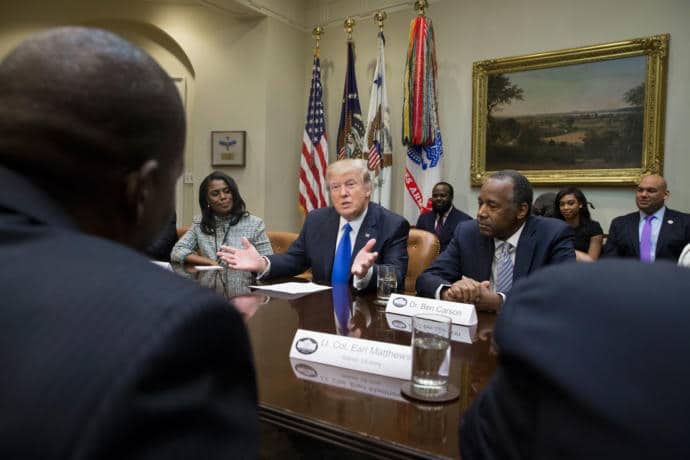Trump and Black History Month
 President Trump attends a Black History Month event on February 1st, the same day he described Frederick Douglass as “somebody who’s done an amazing job and is getting recognized more and more.”CreditPHOTOGRAPH BY MICHAEL REYNOLDS / GETTY
President Trump attends a Black History Month event on February 1st, the same day he described Frederick Douglass as “somebody who’s done an amazing job and is getting recognized more and more.”CreditPHOTOGRAPH BY MICHAEL REYNOLDS / GETTY
Carter G. Woodson, the “Father of Black History Month,” was born in 1875, in Virginia. His parents were former slaves. Despite starting school only in his late teens, he attended the University of Chicago and then Harvard, where, in 1912, he received his Ph.D., becoming the second African-American to do so. He dedicated the rest of his life to promoting the study of African-American life and history, and was the driving force behind the first Negro History Week, which was celebrated in February, 1926. Fifty years later, in 1976, the week-long event was extended to a month.
The first few weeks of the Trump Administration would have dismayed Woodson, whose mission was to have African-American accomplishments recognized, and the complexities of African-American life acknowledged. A string of recent incidents suggests that this Administration will struggle to live up to Woodson’s aspirations. Earlier this month, in a tweet about the importance of education, the Department of Education misspelled the last name of the civil-rights activist and N.A.A.C.P. co-founder W. E. B. Du Bois. (The tweet read “DeBois.”) Last week, during a rambling and combative press conference, President Trump appeared to be unfamiliar with the Congressional Black Caucus, a delegation of African-American lawmakers that champions race-related issues. April Ryan—a veteran journalist who has been a White House correspondent for American Urban Radio Networks since 1997—had asked Trump if he would meet with the group to address matters concerning African-American communities, to which he awkwardly responded by suggesting that she be the one to arrange such a meeting. “Are they friends of yours?” Trump asked Ryan, who is African-American. The sight of a white man instructing a black woman to “set up a meeting” was distressing enough. But Trump’s racially insensitive question also played on the assumption that—borrowing Trump’s regular terminology—“the blacks” are somehow one big family, whose members know each other personally. Meanwhile, it turned out that the C.B.C. had already contacted Trump, in January—and was still waiting for a response.
Then there were Trump’s bizarre comments about Frederick Douglass, the African-American statesman and abolitionist, delivered at a Black History Month event on the first day of February. “Frederick Douglass is an example of somebody who’s done an amazing job and is getting recognized more and more, I notice,” Trump said—prompting immediate speculation about whether the President believed that Douglass, who died in 1895, was in fact still alive. How could this be? Douglass’s autobiography is assigned in high schools and college classrooms across the country. It tells the dramatic story of how Douglass learned to read despite the laws arrayed to prevent enslaved people from doing so, and his remarkable journey from slavery to freedom. Douglass was also—and one might think this might matter to our media-obsessed President—the most photographed person of the nineteenth century, and one of the most famous Americans in history.
If Trump never learned about Douglass, who else didn’t he learn about? Has he heard of Harriet Jacobs, the enslaved woman who lived in a tiny attic for seven years to avoid being raped by her master? Or Ella Baker, the civil-rights activist who helped found the Student Nonviolent Coordinating Committee? Or Bayard Rustin, the organizer of the 1963 March on Washington for Jobs and Freedom, who was pushed to the sidelines of the civil-rights movement because he was gay? Or Carter G. Woodson? If Trump doesn’t know this history, how can he understand, or claim to understand, African-American life and race relations in this country?
During the campaign, Trump bragged that he would “do great with the African-Americans.” But his use of the very term “the African-Americans” betrayed a lack of appreciation for the diversity of interests within African-American communities. Trump has painted African-American life with a broad and despairing brush: African-American communities, to Trump’s mind, have universally been ravaged by drug abuse, crime, and violence. Inner-city “ghettos” are places where, according to Trump, “you buy a loaf of bread and you ending up getting shot.” He mischaracterized the district represented by John Lewis, the civil-rights icon and congressman, as “falling apart (not to mention crime-infested)” and “in horrible shape,” despite the reality that much of the district, which covers parts of Atlanta and its suburbs, is a thriving educational and tech hub.
Trump entered national politics on the crooked back of birtherism. His efforts to undermine the Presidency and to question the citizenship of Barack Obama continued even after Obama produced a long-form birth certificate. Now, more than a month after succeeding Obama in the White House, Trump has yet to offer a specific plan about how to address the employment, housing, and health disparities that African-Americans disproportionately face. His chief strategist is Steve Bannon, the former head of Breitbart News, a Web site that has been a platform for white nationalists, and he appointed Jeff Sessions to be his Attorney General, despite Sessions’s long history of opposing civil-rights and voting-rights legislation.
A century ago, Carter G. Woodson fought for the truth about African-American history to be told. He understood that the recognition of African-American history was essential for the recognition of African-Americans, and that recognition was the first step toward the achievement of full citizenship. In his classic work, “The Mis-Education of the Negro,” from 1933, Woodson wrote, “Real education means to inspire people to live more abundantly, to learn to begin with life as they find it and make it better.” So far, the new President has shown us only that he has a lot to learn.






